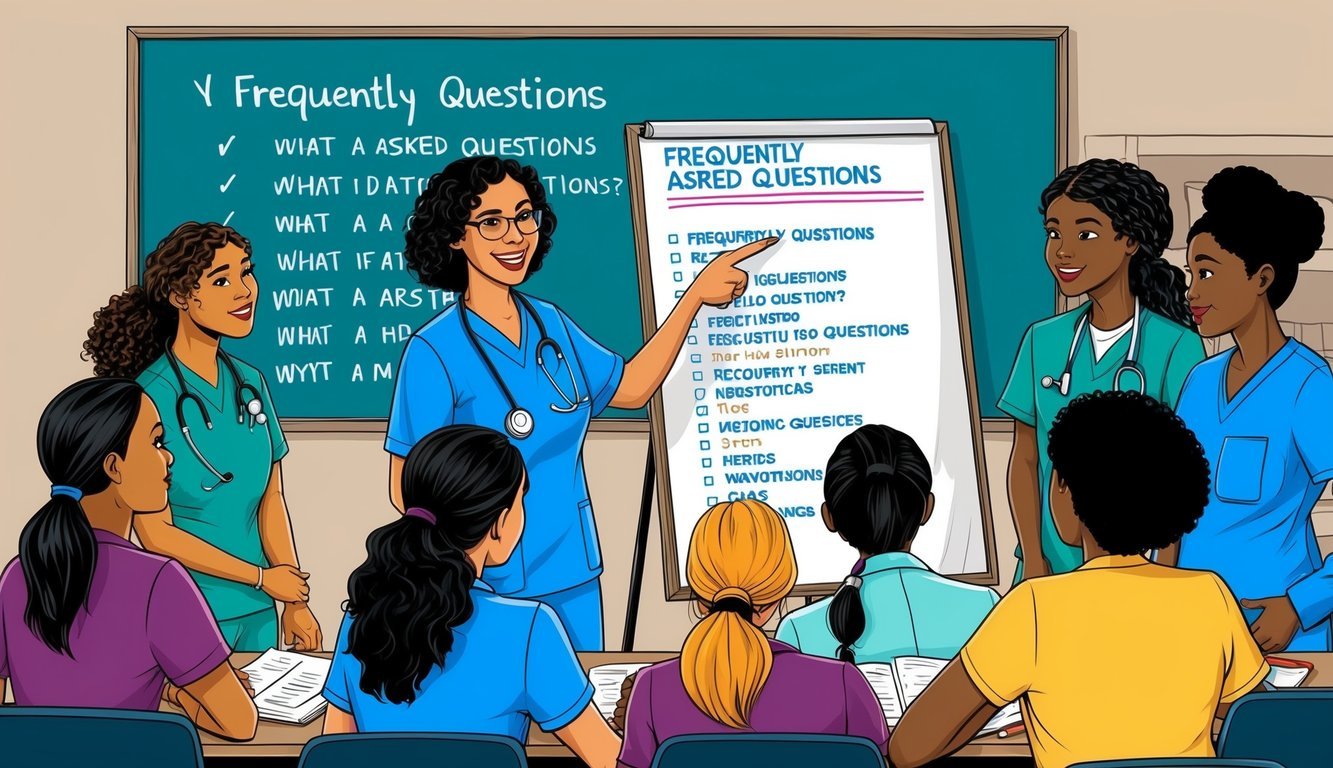Nursing teachers play a crucial role in shaping the future of healthcare by educating the next generation of nurses. As a nursing educator, you have the opportunity to make a lasting impact on both your students and the healthcare system. This position not only requires strong clinical skills but also a dedication to teaching and mentoring.
If you’ve ever considered a career in teaching nursing, understanding the pathways and responsibilities associated with this role is vital.
In this article, you will learn about the steps to become a nursing educator, the educational requirements, and the many professional opportunities available in this field.
You will also discover how nurse educators influence healthcare by training competent, compassionate nurses who are prepared to meet the needs of patients.
Whether you are already a registered nurse or looking to transition into education, this guide will provide you with valuable insights to navigate your journey effectively.
Key Takeaways
- Nursing educators are essential for developing the healthcare workforce.
- There are specific educational pathways to become a nurse educator.
- This career offers various growth and professional development opportunities.
Understanding the Role of a Nurse Educator
The role of a nurse educator is multifaceted, combining clinical expertise with teaching skills.
This section explores the scope of nursing practice for nurse educators, the educational pathways to this role, and the various settings in which they operate.
Scope of Nursing Practice
As a nurse educator, you primarily train the next generation of nursing professionals.
This includes developing curricula that provide both theoretical knowledge and practical skills.
Your background as a registered nurse equips you to integrate clinical experiences into teaching.
You may focus on specific areas, such as medical-surgical nursing or pediatrics, and stay current with evidence-based practices.
Organizations like the National League for Nursing and the American Association of Colleges of Nursing offer standards and resources that guide your practice and help maintain quality education.
The Educational Journey to Becoming a Nurse Educator
To become a nurse educator, you typically need a Master of Science in Nursing (MSN) or higher.
Many programs offer specialized tracks in nursing education, focusing on teaching methodologies and curriculum development.
Once you obtain your degree, obtaining certification through organizations like the National League for Nursing enhances your credibility.
Experience as a clinical nurse educator gives you practical insights that are invaluable in the classroom.
A combination of formal education and hands-on experience prepares you to shape nursing practice and influence healthcare delivery.
Clinical Settings and Educational Institutions
Nurse educators work in various environments, including universities, community colleges, and healthcare facilities.
In clinical settings, you may serve as a preceptor or mentor, guiding new nurses and nursing students through hands-on learning experiences.
In educational institutions, you may design courses and evaluate student performance.
You’ll also collaborate with other faculty members to ensure the nursing program meets accreditation standards.
Your influence helps bridge the gap between theoretical knowledge and clinical practice, essential for preparing nurses to face complex healthcare challenges.
Educational Pathways in Nursing
When pursuing a career as a nurse educator, it is important to understand the educational steps needed to reach this goal.
This section explores the critical pathways, including degrees and certifications that enhance your qualifications and career opportunities in nursing education.
From BSN to MSN and Beyond
To become a nurse educator, you typically start with a Bachelor of Science in Nursing (BSN).
This degree provides a strong foundation in nursing concepts and practices.
Completing a BSN program usually takes four years of full-time study.
After earning your BSN, the next step is to pursue a Master of Science in Nursing (MSN).
This advanced degree may focus on nursing education, preparing you to teach future nurses.
Many MSN programs take 1-2 years to complete, especially for those already holding a nursing degree.
You can also consider programs that lead to a Doctor of Nursing Practice (DNP) or a doctoral degree in nursing.
These degrees, which can take several years, further enhance your expertise and research skills, making you a more competitive candidate for top positions in education.
Doctoral Education and its Significance
Doctoral education in nursing is important for those who aspire to hold leadership roles in nursing education.
A Doctor of Nursing Practice (DNP) focuses on clinical practice, while a PhD in nursing often emphasizes research and theory development.
Holding a doctoral degree gives you an edge in the job market.
It prepares you for roles such as nursing faculty at universities or researchers in healthcare settings.
This level of education enhances your ability to shape nursing curricula and influence healthcare policy.
Additionally, many academic institutions require a doctoral degree for tenure-track faculty positions.
Thus, pursuing advanced education is vital for long-term career success in nursing education.
Specializations and Certifications for Nurse Educators
Once you have your MSN or doctoral degree, obtaining certification as a nurse educator can further your career.
The Certified Nurse Educator (CNE) credential is recognized nationally and shows your commitment to teaching excellence.
Specializations in areas like clinical education, online education, or specific patient populations can also enhance your role as a nurse educator.
These specializations allow you to focus on the areas that interest you and make you a valuable asset to your institution.
In addition, continuous professional development is critical.
Attend workshops, earn more certifications, and keep up with the latest in nursing education and practices to stay current in your field.
The Academic Environment for Nurse Educators
The academic environment for nurse educators plays a crucial role in shaping future nursing professionals.
This section highlights the importance of nursing schools and the impact of medical technology on nursing education and curricula.
Nursing Schools and Curriculum Development
Nursing schools are essential in preparing students for the complex demands of healthcare.
As you develop nursing education curricula, consider incorporating both theoretical knowledge and practical skills.
Factors to focus on include:
- Evidence-Based Practices: Incorporate research findings to stay current with best practices.
- Interprofessional Education: Engage students in learning alongside other health professionals.
- Cultural Competence: Prepare students to provide care to diverse populations.
Collaboration with healthcare institutions enhances curriculum development.
Partnerships help ensure that the education provided aligns with the needs of the healthcare system, addressing issues like faculty shortages and resource allocation.
The Impact of Medical Technology on Nursing Education
Medical technology significantly influences nursing education.
As an educator, incorporating technology in your teaching methods prepares students for modern healthcare environments.
Consider these aspects:
- Simulation Labs: Use high-fidelity simulations to give students hands-on experience.
- Online Learning Tools: Implement e-learning platforms for flexible education options.
- Data Management Skills: Teach students to use electronic health records (EHR) efficiently.
By embracing technology in your curriculum, you prepare students for the digital landscape of healthcare.
Staying updated on technological advancements ensures that your teaching remains relevant and effective.
You can refer to resources like Nursing Education Research for further insights.
Professional Opportunities and Growth
As a nursing educator, you have various paths for professional growth and advancement.
Focusing on your career potential can lead to new roles, certifications, and increased earning opportunities.
Understanding your options can help you make informed decisions.
Career Advancements in Nursing Education
Career advancement as a nurse educator can take many forms. Becoming a clinical instructor or moving into academic leadership roles are common steps.
Many educators pursue a Doctor of Nursing Practice (DNP) or a PhD in Nursing to open more opportunities.
Your salary may increase significantly with advanced degrees.
For example, nurse educators can expect an average salary of $70,000 to $90,000 per year, depending on education and experience.
Specialized credentials such as Certified Nurse Educator (CNE) can enhance your qualifications and marketability.
Continuing Education and Professional Development
Engaging in continuing education is essential for maintaining your skills and knowledge.
Professional development helps you stay updated with the latest trends in nursing education.
You may choose courses in teaching methods, technology integration, or patient care.
Organizations like the American Association of Colleges of Nursing (AACN) offer various resources for ongoing education.
These resources can include workshops, online courses, and networking opportunities.
Pursuing these options can improve your teaching effectiveness and enhance your nursing practice.
Leadership Roles and Administrative Opportunities
With experience, you may find opportunities in leadership or administrative roles.
Positions such as Department Chair or Program Director allow you to shape nursing curriculum and policy.
These roles often require strong communication and organizational skills.
Participation in committees and nursing organizations can also position you for leadership.
Many nurse educators find that taking part in national conferences helps them connect and grow in their field.
Check resources like the National League for Nursing for leadership training programs and networking opportunities.
The Impact of Nurse Educators on Healthcare

Nurse educators play a vital role in shaping the future of healthcare by preparing the next generation of nurses.
Their influence extends to various areas such as healthcare policy advocacy, promoting culturally competent care, and the evolving landscape of nursing education.
Advocacy in Nursing and Healthcare Policy
Nurse educators serve as strong advocates for nursing practice and healthcare policy.
They help to shape policies that affect hospitals, long-term care facilities, and other healthcare environments.
By participating in discussions about healthcare reform and funding for nursing education, they ensure that the needs of both patients and nurses are addressed.
Often, nurse educators collaborate with healthcare organizations to develop programs that improve clinical practice.
This collaboration enhances the quality of care provided in healthcare facilities.
Moreover, by mentoring students, they instill a sense of advocacy in future nurses, empowering them to speak up for their patients and the profession.
Promoting Culturally Competent Care
Culturally competent care is essential in today’s diverse healthcare settings.
Nurse educators prepare nursing students to understand and respect cultural differences.
This knowledge helps them provide better patient care and communicate effectively with patients from various backgrounds.
Incorporating culturally relevant training into the curriculum ensures that future nurses are equipped to meet the needs of their communities.
This training often includes understanding different health beliefs, traditions, and the impact of culture on health practices.
By focusing on this aspect of care, nurse educators foster a more inclusive environment in hospitals and clinical practice.
The Future of Nursing Education
Advancements in technology and changing healthcare needs are shaping the future of nursing education.
Nurse educators are adapting their teaching methods to provide hands-on experiences using simulations and digital tools.
This prepares students for real-world challenges in healthcare.
Moreover, addressing the nursing shortage is crucial.
Schools are exploring flexible online programs, which have grown in popularity.
This shift allows more individuals to enter the nursing profession, ensuring a steady supply of qualified nurses to meet the demands of healthcare facilities.
By focusing on these areas, nurse educators are essential to the ongoing development of nursing science and practice, ultimately benefiting patients and healthcare systems.
Frequently Asked Questions

This section addresses common questions about becoming a nursing instructor.
You’ll find information on qualifications, salary, transitions from clinical roles to teaching, necessary certifications, and key responsibilities in a clinical setting.
What qualifications are required to become a nursing instructor?
To become a nursing instructor, you typically need at least a Master’s degree in Nursing.
Some institutions may accept a Bachelor’s degree if accompanied by relevant experience.
You should also hold a valid nursing license.
What is the average salary for a nursing teacher in the United States?
The average salary for nursing educators in the United States is approximately $81,523 per year.
This figure varies based on factors like location, experience, and the type of institution you work for.
For more detailed salary information, you can visit Indeed.
How can one transition from a clinical nursing role to a teaching position?
To transition from clinical nursing to teaching, consider pursuing advanced education, such as a Master’s or Doctorate in Nursing Education.
Gaining experience in mentorship or training roles can also help.
Networking with current educators can provide insights and open opportunities.
What certifications are necessary to teach nursing courses?
Most nursing programs require instructors to obtain specific certifications, such as the Certified Nurse Educator (CNE) credential.
Check with your desired institution for any additional or specific requirements.
What advanced degrees are most beneficial for a career in nursing education?
A Master’s degree in Nursing Education or a Doctorate in Nursing Practice (DNP) can be highly beneficial.
These degrees equip you with both teaching skills and advanced nursing knowledge.
These qualifications can increase your job prospects and potential salary.
What are the key responsibilities of a nurse educator in a clinical setting?
A nurse educator in a clinical setting has several key responsibilities.
These include teaching students in practical environments, developing curriculum, and assessing student performance.
You will also mentor students and ensure they meet clinical standards.
Engaging with healthcare professionals and staying current in nursing practices is essential.

